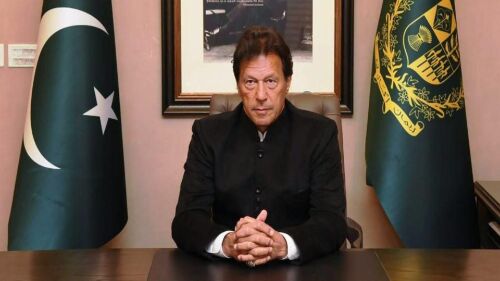Hitting the spot
Imran Khan’s expectation from embassies to win investments is misplaced; the solution rather lies in overhauling the extremism-backed political system

On May 5, Pakistan's Prime Minister Imran Khan asked his country's ambassadors to abandon colonial-era attitude and treat their diaspora with compassion. Addressing the envoys virtually, he rebuked them for their failure to serve overseas Pakistanis.
However, is not the Pakistani political system itself to be blamed? Are Pakistani diplomats immune from their country's ethos?
Imran Khan should not forget the proverb 'As you sow, so shall you reap'. Pakistan is reaping the fruits of a decades-long process that has trampled on the rights of the common man and systematically damaged the very fabric of the society. This trend has affected the functioning of its embassies too. After all, a country's diplomatic representation is a reflection of the government and its values.
I have narrated an incident in my book 'Karachi Halwa'. A New York-based Pakistani friend had expressed his admiration for how India had put in place a system to nurture talent, and how in the global corporate arena, Indians have done well and gone on to become the CEOs of some of the world's leading organisations. He then went on to lament that Pakistan's youth today can only aspire to become CEOs of organisations like the Taliban, Al Qaida, Lashkar-e-Taiba, Jaish-e-Mohammad and others of this ilk!
Pakistanis are being deprived of the opportunity to realise their full potential because their country's educational system has not kept pace with changing needs, and has, in fact, been derailed. The prevalent mood is one of cynicism and disappointment as successive governments have adopted the appeasement of Islamic conservatism as a fundamental policy plank. These policies disregard the aspirations of Pakistanis who would like their government to adopt a more forward-looking approach.
The government machinery encourages an authoritarian mindset among government officials. Drawing a comparison between the Indian and Pakistan embassies abroad, Imran Khan said that Indian embassies were "very proactive" in bringing investments to India as compared to Pakistani embassies. There is no doubt that Indian diplomats are much more focused on furthering their country's economic interests but is the Pakistani ethos also not to be blamed? Is Pakistan's investment climate even remotely comparable to India's?
A country's investment climate refers to the economic, financial, and socio-political conditions that determine whether individuals, banks, and institutions are willing to lend or invest in the businesses operating there. The unfavourable investment climate of Pakistan is due to many factors, but the rise of Islamic extremism figures at the top of the list.
Pakistan is home to the largest number of internationally designated terrorist entities and individuals including Jamat-ud-Dawah, Lashkar-e-Taiba, Jaish-e-Mohammed and Hizbul Mujahideen. It may be recalled that during his visit to Washington DC in July 2019, Pakistan's Prime Minister Imran Khan had himself admitted that successive governments in Pakistan did not tell the truth to the United States that 40 different militant groups were operating within Pakistan, that the country still has about 30,000 to 40,000 militants who have been trained and fighting in Afghanistan or Kashmir and that Jaish-e-Mohammed is operating in Pakistan as well as in India. Coming from the horse's mouth, this is incontrovertible proof of Pakistan's direct involvement in terrorism. When the Prime Minister is saying this, will investors flock to Pakistan?
Moreover, the grey-listing of Pakistan by the Financial Action Task Force also makes investors shy away from investing there.
FATF works with the International Monetary Fund (IMF) and the World Bank those take into account its findings and recommendations. For instance, the IMF puts conditions for bailout packages based upon the fulfillment of FATF-related compliances. Thus, the naming and shaming by the FATF has costs, which Pakistan has found out. Pakistan's economy is already in shambles, and the FATF grey-listing adds to its woes.
Imran Khan said that the embassies "should work to bring investment into the country which is going through very bad financial conditions right now". Pakistan's economic and financial woes are not hidden from anyone. However, the Pakistan government seems paralysed when it comes to the question of taking meaningful steps for economic recovery. Pakistan's textile industry has been facing a shortage of raw cotton and yarn. Currently, cotton and yarn imports are allowed from all countries except India. The textile sector in Pakistan strongly favours the import of cotton from India as it is relatively much cheaper. Pakistan Textile Exporters Association Chairman Khurram Mukhtar has stated that the import of raw cotton, yarn and grey fabric from India will bridge the gap in demand and supply and will enable Pakistani exporters to continue the growth momentum.
Consequently, in March this year, Pakistan's textile ministry headed by Prime Minister Imran Khan recommended the lifting of a ban on the import of cotton from India. On March 31, Pakistan's Finance Minister Hammad Azhar announced that Pakistan would allow limited imports of cotton, sugar and wheat from India in order to rein in rampant inflation. The Pakistan government, however, made a U-turn on these decisions within 24 hours under pressure from ultra-right Islamic parties.
Significantly, the Pakistani Finance Minister had stated that the decision to allow the import was made 'in the interest of the people'. Logically, therefore, the decision not to allow these imports is not in the people's interests!
In such a background, it is not just the functioning of the embassies but the entire political system in Pakistan that needs to be overhauled. The government must clamp down on the extremist religious parties and their leaders. Unless that happens, Pakistan's embassies will not be able to fulfill Imran Khan's 'diktat' of bringing more investments into the country.
Views expressed are personal



